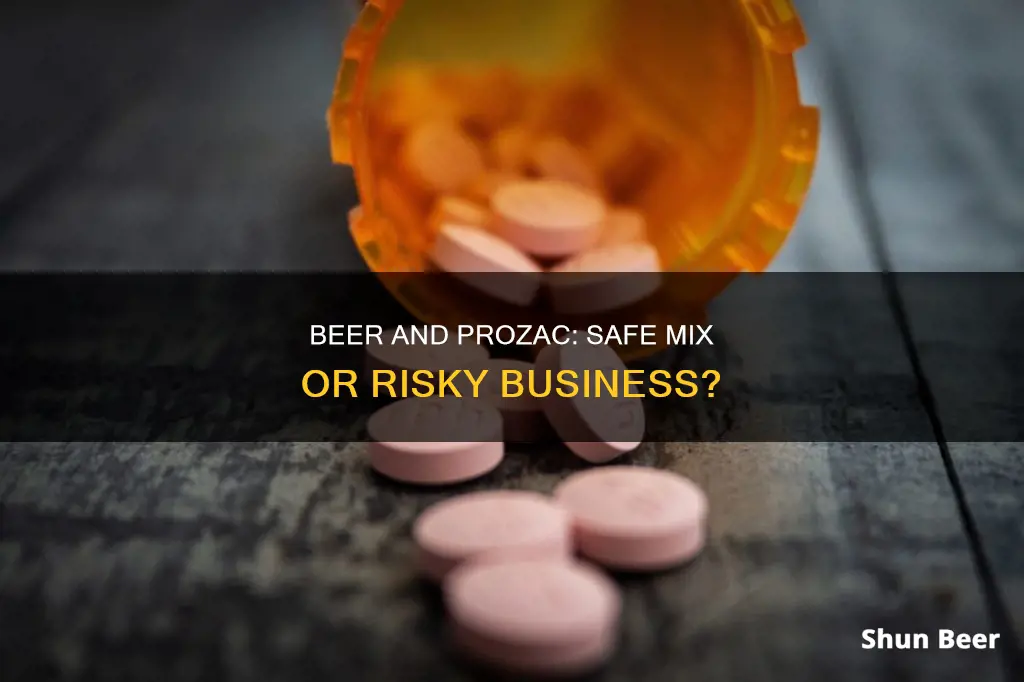
Prozac, a commonly prescribed antidepressant, and alcohol do not mix well. While it may not cause immediate physical harm, combining the two can intensify the side effects of both substances, leading to a dangerous situation. Prozac is a selective serotonin reuptake inhibitor (SSRI) that alters serotonin levels in the brain to treat depression and anxiety. Alcohol, on the other hand, is a depressant that can negatively impact brain function and cause impaired judgment, among other issues. When mixed, Prozac and alcohol can lead to increased sedation, confusion, irregular heart rate, seizures, and even suicidal thoughts. Even a small amount of alcohol can have these adverse effects, and the combination may reduce the effectiveness of Prozac in treating mental health disorders. It is recommended to avoid alcohol while taking Prozac to ensure the medication works as intended and to prevent harmful interactions.
| Characteristics | Values |
|---|---|
| Should I drink beer while on Prozac? | It is not recommended to mix Prozac and alcohol. |
| What are the risks of drinking beer while on Prozac? | Increased sedation, confusion, irregular heart rate, seizures, and other potential symptoms. |
| What are the side effects of drinking beer while on Prozac? | Increased drowsiness, dizziness, impaired judgment, mood swings, agitation, suicidal thoughts, digestive issues, and serotonin syndrome. |
| How long should I wait after taking Prozac to drink beer? | Prozac can stay in your system for up to two weeks after your last dose. It is recommended to consult a healthcare provider to determine when it is safe to consume alcohol. |
What You'll Learn

Prozac and alcohol: a dangerous combination
Prozac (fluoxetine) is a commonly prescribed medication for the treatment of depression, anxiety disorders, and other mental health issues. It is one of the most well-known selective serotonin reuptake inhibitors (SSRIs), which work by changing the way the brain processes serotonin, the mood hormone. While Prozac is considered safe and effective, it is recommended to avoid drinking alcohol while taking this medication.
Mixing Prozac and alcohol can lead to some harmful interactions and increase the intensity of side effects from both substances. As a depressant, alcohol can lead to a temporary increase in mental illness symptoms, which may be especially detrimental if the individual is already mentally impaired from drinking. Additionally, since Prozac and alcohol can both cause sedation and tiredness, mixing the two may result in extreme drowsiness, impaired judgment, and an increased risk of accidents or injuries.
Other potential side effects of combining Prozac and alcohol include confusion, irregular heart rate, seizures, digestive issues, and the development of serotonin syndrome, a severe and potentially life-threatening drug reaction. Furthermore, alcohol can interfere with the effectiveness of Prozac, reducing its ability to manage symptoms of depression, anxiety, and panic disorders. This can put individuals with depressive or mood disorders at increased risk, potentially exacerbating their symptoms.
While an occasional drink while on Prozac may not have major adverse effects, regular drinking can lead to decreased effectiveness of the medication. It is important to note that Prozac stays in the body for a prolonged period, even after discontinuation, so it is not necessary to skip doses of Prozac to drink alcohol. Instead, individuals should consult their healthcare provider for advice and to discuss any concerns about alcohol consumption while taking this medication.
Drinking Beer in Your Car: Pennsylvania's Laws
You may want to see also

Prozac's side effects
Prozac, also known as fluoxetine, is a commonly prescribed medication for the treatment of depression, anxiety disorders, and other mental health issues. It is an antidepressant that belongs to a group of medicines called selective serotonin reuptake inhibitors (SSRIs). While Prozac can be effective in treating these conditions, it is important to be aware of its potential side effects.
One of the most common side effects of Prozac is drowsiness or increased sedation. This can lead to impaired coordination, judgment, and motor skills, which can be dangerous, especially when operating vehicles or heavy machinery. Prozac may also cause changes in eating habits and weight loss, general weakness, concentration and memory issues, and unusual dreams or changes in sleep habits. It can also lead to sexual problems, such as a lower sex drive or problems with erection or ejaculation.
In rare cases, Prozac may cause serious side effects such as weight gain or loss without trying, changes in menstrual periods, feelings of overwhelming happiness or restlessness, bleeding gums or easy bruising, chest pain or pressure, severe dizziness, and seizures. It can also lead to allergic reactions, with symptoms such as breathing problems, swelling of the face or throat, and skin rashes.
Additionally, mixing Prozac with alcohol can lead to further side effects and health risks. Alcohol is a depressant that affects brain function and can cause similar side effects to Prozac, including drowsiness and impaired judgment. Combining the two can increase sedation and dizziness, severely impair judgment, and cause mood swings, agitation, and digestive issues. In some cases, it may even lead to the development of serotonin syndrome, a severe and potentially life-threatening drug reaction. Therefore, it is recommended to avoid drinking alcohol while taking Prozac to minimize the risk of adverse effects.
Beer and Bone Grafts: What You Need to Know
You may want to see also

Alcohol's side effects
Alcohol is a drug that slows down the messages between your brain and your body. It is a depressant that impacts your brain function. Even small amounts of alcohol are still linked to the development of certain diseases, including several types of cancer.
The short-term effects of alcohol include:
- Trouble thinking and impaired judgment
- Trouble hearing and seeing
- Decreased motor skills
- Hangovers
- Accidents and violence
- Alcohol poisoning
The long-term effects of alcohol include:
- Cardiomyopathy
- Arrhythmias
- High blood pressure
- Liver disease
- Pancreatitis
- Cancer
- Weakened immune system
- Weight gain
- Diabetes
- Stroke
- Dementia
- Liver cirrhosis
- Other liver conditions like liver failure
- Interference with antidepressant medication
- Alcohol dependence or addiction
- Long-term cognitive impairment
- Self-harm and suicide
Beer and Orajel: A Safe Mix?
You may want to see also

Mixing Prozac and alcohol: side effects
Mixing Prozac and alcohol can lead to a variety of side effects, ranging from mild to severe. While Prozac is a commonly prescribed and generally safe medication for treating depression and anxiety, it is important to be aware of the potential risks when combining it with alcohol.
Increased Sedation and Drowsiness
One of the most common side effects of mixing Prozac and alcohol is increased sedation and drowsiness. Prozac, as an antidepressant, can cause tiredness, and when combined with alcohol, this effect can become more intense. Even a single drink while taking Prozac can lead to extreme drowsiness, impairing judgment and motor skills, and increasing the risk of accidents or falls.
Impaired Judgment and Coordination
In addition to sedation, mixing Prozac and alcohol can further impair judgment and coordination. Alcohol already affects an individual's ability to think clearly, make decisions, and coordinate movements. When combined with Prozac, these effects can be amplified, leading to dangerous situations such as impaired driving or increased risk of injuries.
Worsening of Depression and Anxiety Symptoms
Prozac is often prescribed to treat depression and anxiety by increasing serotonin levels in the brain. However, alcohol is a depressant, and its consumption can counteract the effects of Prozac, leading to a temporary increase in mental illness symptoms. This can be especially harmful if the individual is already mentally impaired due to alcohol consumption.
Digestive Issues and Other Physical Effects
Mixing Prozac and alcohol can also lead to physical side effects, such as digestive issues, nausea, vomiting, and headaches. Additionally, there is an increased risk of developing serotonin syndrome, a severe and potentially life-threatening drug reaction characterized by an overproduction of serotonin in the brain.
Increased Risk of Suicidal Thoughts and Self-Harm
Prozac and other antidepressants have been associated with an increased risk of suicidal thoughts and self-harm. When combined with alcohol, which impairs judgment and decision-making, the risk of acting on these thoughts may be higher.
Reduced Effectiveness of Prozac
Alcohol can interfere with the effectiveness of Prozac, reducing its ability to treat depression and anxiety. This can lead to a worsening of symptoms and potentially undo any benefits gained from taking the medication.
It is important to note that these side effects can vary in severity and may be influenced by factors such as the amount of alcohol consumed, the dosage of Prozac, and individual differences in metabolism and tolerance. If you are taking Prozac, it is recommended to avoid alcohol consumption to minimize the risk of adverse effects.
Drinking Beer in Public: Hong Kong's Laws and Culture
You may want to see also

Treating co-occurring disorders
Co-occurring disorders, also known as dual diagnosis, refer to the presence of a mental health condition and a substance use disorder. Treatment for co-occurring disorders requires a holistic, whole-person approach that incorporates medication management and therapy interventions.
Detox
For those with a severe physical dependence on alcohol, the first step in treatment may be a medically-monitored detox setting. This can help manage the potentially dangerous and uncomfortable symptoms of alcohol withdrawal.
Inpatient or Residential Treatment Programs
Following detox, inpatient or residential treatment programs offer 24/7 monitoring and care in a hospital or treatment facility.
Partial Hospitalization Programs (PHP)
PHPs are outpatient treatment programs that offer daily therapy and support, with the freedom to sleep at home.
Intensive Outpatient Programs (IOP)
The next level of care is an intensive outpatient program, which offers several hours of support and therapy a day, with a more flexible weekly schedule.
Outpatient Programs (OP)
OPs offer the most flexibility in terms of scheduling, with regular support as needed. This type of program prepares individuals to restore daily routines and activities and is often the final step before transitioning to aftercare.
Aftercare
After completing treatment, an individualized aftercare plan is implemented to prevent relapse and provide emergency planning. This may include ongoing therapy, support groups, and other resources to maintain long-term recovery.
Medication
Medication can be an important component of treating co-occurring disorders. Antidepressants, such as Prozac, can help manage symptoms of depression, while other medications, such as naltrexone and acamprosate, can aid in reducing alcohol cravings and supporting recovery.
Therapy
Behavioral and psychosocial therapies are also crucial in treating co-occurring disorders. Approaches such as cognitive behavioural therapy, motivational interviewing, and behavioural activation therapy can help address both the mental health and substance use disorders.
Mutual-Help Groups
Mutual-help groups, such as Alcoholics Anonymous (AA), can also be beneficial in treating co-occurring disorders. These groups provide support, accountability, and a sense of community, which can enhance recovery and reduce symptoms of depression.
It is important to note that treatment plans should be individualized and may vary depending on the specific needs and circumstances of the individual. Seeking professional help is essential to ensure safe and effective treatment for co-occurring disorders.
Digital Beer Rebates: How Do They Work?
You may want to see also
Frequently asked questions
It is not recommended to mix Prozac and alcohol as it could lead to serious health issues. Alcohol is a depressant that can negatively impact your mental health and reduce the effectiveness of Prozac.
Combining Prozac and alcohol can increase sedation, causing extreme drowsiness and impaired judgment. It can also lead to other side effects such as lightheadedness, dizziness, and feelings of hopelessness.
It is recommended to consult a healthcare provider to determine when it is safe to consume alcohol after stopping Prozac. It can take up to 30 days for the body to reset to natural serotonin levels and overcome the effects of Prozac.







